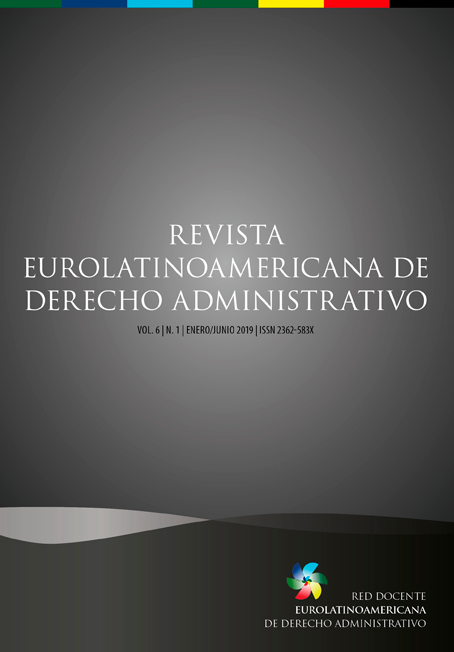The reform of the justice system as a public policy: have we already found the right path?
DOI:
https://doi.org/10.14409/redoeda.v6i1.8740Keywords:
justice system, reform, public policy, CERIAJUS, CCRJAbstract
In this paper we state that the justice system’s reform must be considered as a public policy. This necessarily implies the Government performing actions to solve the Peruvian justice system’s defects and problems. In this sense, we assume that not only does the justice system comprise the Judiciary, but also every other entity where the citizen can find a solution to his conflicts or legally relevant problems (Ministerio Público, Instituto de Medicina Legal, RENIEC, SUNARP, among others). Thus, not only is the Government’s role in the system’s reform limited to approving rules or declaring principles, but also must be materialized in actions from a dynamic point of view. Precisely, in our paper we formulate some actions the Government must carry out to protect the access to justice of people in circumstances in which structural barriers hinder them from exercising their rights. To this effect, we analyze critically the CERIAJUS and CCRJ reports and the Peruvian Constitutional Court and Judiciary’s statements.
References
ABAD, Samuel. Discapacidad e interdicción: una sentencia ejemplar. Laley.pe. Recuperado de https://laley.pe/art/5378/discapacidad-e-interdiccion-una-sentencia-ejemplar. 22 de mayo de 2018.
ÁLVAREZ, Lorena. No te mato porque te quiero. Lima: Editorial Planeta Perú, 2018.
ARENDT, Hannah. Crisis de la República. Buenos Aires: El cuenco de plata, 2015.
BULCOURF, Pablo y CARDOZO, Nelson. ¿Por qué comparar políticas públicas? Documento de trabajo 3. Buenos Aires: Política comparada.com.ar, 2018.
BUSCAGLIA, Edgardo. Deficiencias principales en los sistemas de justicia: Propuestas de medidas correctoras. [s.l.]. [s.n.] [2006?].
CALDERA, Alex. Los problemas públicos: naturaleza y estructuración. [s.l.]. [s.n.] 2005.
COMISIÓN CONSULTIVA PARA LA REFORMA DEL SISTEMA DE JUSTICIA. Hacia un Sistema de Justicia honesto y eficiente. 25 de julio de 2018.
COMISIÓN ESPECIAL PARA LA REFORMA INTEGRAL DE LA ADMINISTRACIÓN DE JUSTICIA. Plan Nacional de Reforma Integral de la Administración de Justicia. 23 de abril de 2004.
DE BELAUNDE, Javier. La reforma del sistema justicia, ¿en el camino correcto? Breve balance de su situación actual y de los retos pendientes. Lima: Fundación Konrad Adenauer e Instituto Peruano de Economía Social de Mercado, 2006.
DE BELAUNDE, Javier; EGUIGUREN, Francisco; GARCÍA, Víctor y PÁSARA, Luis. El sistema de justicia hoy. THĒMIS-Revista de Derecho, Lima, n. 58. p. 213-226. 2010.
DWORKIN, Ronald. A Matter of Principle. Cambridge, Massachusetts: Harvard University Press, 2000.
DWORKIN, Ronald. Justice in robes. Cambridge, Massachusetts: The Belknap Press of Harvard University Press, 2006.
EGUIGUREN, Francisco. ¿Qué hacer con el sistema judicial? Lima: Agenda Perú, 1999.
GONZALES, Gorki. Los jueces. Carrera judicial y cultura jurídica. Lima: Palestra Editores, 2009.
HART, H.L.A. El concepto de Derecho. 3. ed. Buenos Aires: Abeledo Perrot, 2009.
IBÁÑEZ, Juana. En: STEINER, Christian y URIBE, Patricia (Eds.). Convención Americana sobre Derechos Humanos. Comentario. Bogotá: Fundación Konrad Adenauer - Programa Estado de Derecho para Latinoamérica, 2014.
LINDBLOM, Charles. El proceso de elaboración de políticas públicas. Madrid: Ministerio para las Administraciones Públicas, 1991.
MONGE, Gonzalo. La ausencia de recursos humanos, materiales y logísticos en nuestro sistema de justicia como obstáculo a los derechos fundamentales. EnfoqueDerecho.com. Recuperado de https://www.enfoquederecho.com/2014/05/12/la-ausencia-de-recursos-humanos-materiales-y-logisticos-en-nuestro-sistema-de-justicia-como-obstaculo-a-los-derechos-fundamentales/ 12 de mayo de 2014.
MONGE, Gonzalo. La reforma del sistema de justicia: ¿Qué hacemos los abogados al respecto? Agnitio.pe. Recuperado de http://agnitio.pe/articulo/la-reforma-del-sistema-de-justicia-que-hacemos-los-abogados-al-respecto/ 5 de agosto de 2018.
PÁSARA, Luis. Una reforma imposible. La justicia latinoamericana en el banquillo. Lima: Fondo Editorial de la Pontificia Universidad Católica del Perú, 2014.
PRIORI, Giovanni. Lineamientos para la tutela del derecho a la efectividad de la tutela jurisdiccional. En: PRIORI, Giovanni (Coord.). Proceso y Constitución. Efectividad y ejecución de las resoluciones judiciales. Lima: Palestra Editores, 2014. p. 173-182.
QUIROZ, Alfonso. Historia de la corrupción en el Perú. 3. ed. Lima: Instituto de Estudios Peruanos, 2019.
REDACCIÓN PERÚ21. Jueza juega Sudoku en plena audiencia. Perú21.pe. Recuperado de https://peru21.pe/lima/jueza-juega-sudoku-plena-audiencia-7438-noticia/ 13 de diciembre de 2011.
SUBIRATS, Joan y otros. Análisis y gestión de políticas públicas. Barcelona: Editorial Ariel, 2008.
TERCERA SALA CIVIL DE LA CORTE SUPERIOR DE JUSTICIA DE LIMA. Resolución 4 del 25 de abril de 2018 recaída en el Expediente 25158-2013-0-1801-JR-CI-02.
TRIBUNAL CONSTITUCIONAL. Sentencia recaída en el Expediente 000763-2005-PA/TC del 13 de abril de 2005.
TRIBUNAL CONSTITUCIONAL. Sentencia recaída en el Expediente 05121-2015-PA/TC del 24 de enero de 2018.
TRIBUNAL CONSTITUCIONAL. Sentencia recaída en el Expediente 00889-2017-PA/TC del 17 de abril de 2018.
TRIBUNAL CONSTITUCIONAL. Sentencia recaída en el Expediente 01479-2018-PA/TC del 5 de marzo de 2019.
VARGAS, Erick. El mejor remedio para un mal abogado podría ser... ¿otro abogado? Revista IUS ET VERITAS, Lima, n. 58. p. 202-224. 2019.
ZUSMAN, Shoschana. Nuevas tendencias en la enseñanza del Derecho: la destreza legal. Derecho PUCP, Lima, n. 52. p. 929-935. 1999.
Downloads
Published
How to Cite
Issue
Section
License
Authors who publish in this Journal agree to the following terms:
- Authors retain copyright and grant the Journal of Constitutional Research the right of first publication with the article simultaneously licensed under the Creative Commons - Attribution 4.0 International which allows sharing the work with recognition of the authors and its initial publication in this Journal.
- Authors are able to take on additional contracts separately, for non-exclusive distribution of the version of the paper published in this Journal (eg.: publishing in institutional repository or as a book), with a recognition of its initial publication in this Journal.
- Authors are allowed and encouraged to publish their work online (eg.: in institutional repositories or on their personal website) at any point before or during the submission process, as it can lead to productive exchanges, as well as increase the impact and the citation of the published work (see the Effect of Open Access).



























.png)





